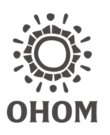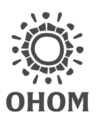Volunteer Spotlight: Valerie and Gloria

Meet Valerie and Gloria, two of OHOM’s dedicated volunteers, pictured here at Laurelhurst Park in Portland, Oregon
Finding OHOM & Their “Why”
Valerie was born in Venezuela and grew up in Maryland before moving to Portland after college. As a design strategist she helps clients “focus on issues to improve matters around the world that relate to people and planet.” In March 2018, after seeing an OHOM network post seeking new board members, she joined. “When I was brought in, OHOM was on the cusp of a huge change. The organization’s founder, Johnny Stallings, had moved on, and Carla, our Executive Director, was just getting her bearings. Their immediate goal was to grow the board and modernize the organization.” The opportunity felt in line with her values and her skills as a strategist.
In early 2020, Valerie introduced her former colleague, Gloria Pitkin, to OHOM. “In addition to her amazing problem-solving skills and passion for social justice issues, Gloria also has deep experience in theater—it seemed like a natural fit. I just knew with her on the team we could get things done that wouldn’t happen without her.”
Gloria, born in Mexico and raised in New Mexico and the Pacific Northwest, worked as an immigration legal assistant before meeting Valerie. Once they met she began to realize the connection of various systems of incarceration. “For me, immigration reform, what’s happening on the border and prison reform are very much interrelated… Whether that is truly in prison or whether that is in a detention center, [the system] is pulling away people whose voices and whose contributions are not valued, and hiding them from society.”
Gloria sees art as central to supporting and healing injustice: “I see these oppressive systems working as a cog in a machine. I want to see us pull apart each of these cogs and replace them with something healthy, beautiful and artistic. That is when I see real healing happening and people changing. OHOM shows that art is necessary for people to survive, to care about the world and I think that there is a shift happening. I think people are ready to be healed and don’t want to continue to suffer. Art is going to be central to that. Racial justice is going to be central to that.”
Expanding our board
Another responsibility of Valerie’s is the board recruitment committee where she is able to “help define what it is we’re looking for and make sure the request is getting shared with the types of people we want to bring on.” Right now she is focused on adding more formerly incarcerated voices, specifically OHOM’s program alumni. “There is a great alumni community out there that we have so much potential to activate and which we hope to do in the coming year.” Their perspective is so valuable because “they can help us at every step of the way to check our decisions and make sure they reflect the needs of the community we serve. The one formerly incarcerated member we have on the board has helped us learn so much, prevent so many missteps and help us see our blindspots.” Avoiding tokenization is a big priority as we’re expanding our board, and we’re eager to add more formerly incarcerated voices in the next few months.
Finally, bringing in more diversity to volunteers and program participants is something both Gloria and Valerie each would like to see moving forward. Valerie describes: “Most of our participants are white, which makes sense because most of Oregon is white. We would love to bring in more volunteers of color and find ways to share this opportunity with incarcerated people of color too. It is up to us to find out what the barriers are and how to make them feel more comfortable. Here is a really great opportunity to design with the folks that we want to reach.”

